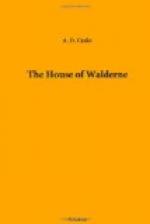The earl had found it necessary to put a check upon the constant slaughter of the deer in his large domains, which bade fair to depopulate the forests. Therefore he had especially forbidden the pages to shoot a stag or fawn, under any pretext, and as his orders had been once or twice transgressed, he had caused it to be intimated that the next offence, on the part of a page, would be punished by expulsion: a very light penalty, when on many domains, notably in the royal parks, it was death to a peasant or any common person to kill the red deer.
All the young candidates for knighthood at Kenilworth had their arrows marked, for an arrow was too expensive a thing to be wasted, and therefore the young archers regained their shafts when they had done their work at the target. Such marks were useful also in preventing disputes.
One day, out in the woods, letting fly these shafts at lesser game, such as they were permitted to kill, Hubert lost one of his arrows. A few days afterwards the chief forester came up to the castle to see the earl, who had just returned after a prolonged absence, and his communication caused no little stir.
The next day, after chapel, the earl ordered all the pages, some twenty-five in number, to assemble in their common room, where they received such lessons in the “humanities” from the chaplain as their lord compelled them to accept, often against their taste and inclination, for they thought nothing worth learning save fighting and hunting.
When they had assembled, the earl, attended by the chaplain, appeared. They all stood in humble respect, and he looked with a keen eye down their ranks, as they were ranged about twelve on each side of the hall. A handsome, athletic set they were, dressed in what we should call the Montfort livery—a garb which set off their natural good looks abundantly—the dark features of Drogo; the light eyes and flaxen hair of the son of a Provencal maiden, our Hubert; were fair types of the varieties of appearance to be met amongst the groups.
The earl’s features were clouded.
“You are all aware, my boys, of the order that no one below knightly rank should shoot deer in my forests?”
“We are,” said one and all.
“Does any page profess ignorance of the rule?”
No reply.
“Then I have another question to put, and first of all, let me beg most earnestly to press upon the guilty one the necessity of truth and honour, which, although it may not justify me in remitting the penalty, may yet retain him my friendship. A deer has been slain in the woods, and by one of you. Let the guilty boy avow his fault.”
No one stirred.
The earl looked troubled.
“This grieves me deeply,” he said, “far more than the mere offence. It becomes a matter of honour—he who stirs not, declares himself innocent, called by lawful authority to avow the truth as he now is.”




